- Home
- Diana Wynne Jones
The Islands of Chaldea Page 12
The Islands of Chaldea Read online
Page 12
“Because that’s his name,” I said.
Holy Owen shrugged and wrote. “I always heard,” he muttered as he wrote, “that Green Greet was the great spirit of Bernica. Lord of the West. It’s as bad as people calling their lizards Dragonlady, if you ask me.”
He blotted the letter, folded it and gave it to one of the guards.
“Make the best time you can,” he said, “and be sure to explain that we need an answer by the morning.”
“Thank you,” I said.
Looking back on it, I see they did not treat us too badly. It was just that I disliked Holy Owen and, before long, I disliked Lew-Laws even more. Holy Owen went away after he had given the guard the message and we did not see him again. But Lew-Laws stayed with us all the time. He had obviously been told to keep an eye on us and he kept sighing about it as if it were a real burden.
“What do they think we’re likely to do?” Ivar whispered angrily to me. “Make off with their valuables?”
“What valuables?” I said, looking around the bare stone room. We never knew the answer to that one, but, as I said, we were not badly treated. Supper was delivered to the room and it was a truly delicious fish stew. There were tastes in it that I had never met before.
While I was bullying Aunt Beck to eat it, Ogo said to Lew-Laws, “What are these lovely flavours? I remember something like this from Logra.”
Lew-Laws sighed. “Herbs,” he said. “I hate them. They grow the things down south where they grow the vines and the olives and things. I wish they’d never been invented.”
Lew-Laws was like that all the time. A wet week. Nothing pleased him. By bedtime, I was truly depressed. I could not see our mission succeeding. I could not see any way Aunt Beck could be cured. “Take your stockings off, Beck!” I shouted at her, and I saw myself shouting at her like this for the rest of both our lives.
It was like that again in the morning. I shouted my aunt into her clothes and we went back to the bare stone room to find Lew-Laws making faces as he drank some kind of hot herb tea that went with the bread for breakfast. When Ivar and Ogo had come yawning in, Lew-Laws sighed and said, “High Holy Gronn needs to see you. The gods alone know why. I am to take you to The Singing as soon as you have eaten. For my sins.”
“Are you very sinful?” Ogo asked, mock innocently. Ivar tried not to laugh.
Before Lew-Laws could answer, Aunt Beck said, “Where’s my porridge? I can’t start the day with bread.”
“Ah,” Lew-Laws said. “If I knew where to find porridge in Gallis, I would be a happy man, my good woman.”
“No, really? A happy man?” Ivar said.
Lew-Laws pretended not to hear. “Bread,” he said, “is what we eat here, woman. It’s stale of course, but that is what there is.”
“Eat it, Beck,” I said. “You’ll be hungry if you don’t.”
“Then I need butter,” my aunt said. “And honey.”
Finn came in at this point with Green Greet on his shoulder. “Green Greet will eat the bread for you,” he said. “They’ve no seeds of any kind for him in the kitchen. No nuts either. And did you know,” he asked Lew-Laws, “that some great beast got into the kitchen in the night and ate all the fish stew in the cauldron?”
Plug-Ugly, I thought. Oh dear.
Lew-Laws sighed. “It is not my place,” he said, “to criticise the gods, if they choose to deny us fish for breakfast—”
“Where’s my butter?” said Aunt Beck.
“Did the beast eat all the butter too?” Ogo asked.
“Butter is always scarce,” Lew-Laws began dismally. “I haven’t had butter since—” He was interrupted by a cross-looking serving man arriving with a bowl of oil – olive oil, he told me – to dip the bread in. This was just as well. Ivar choked trying not to laugh at Lew-Laws incessant moaning and Ogo had to hammer him on the back. I would have been quite as bad, except that I was busy dipping bread for Aunt Beck and trying to persuade her that it was quite as good as porridge. She did eat some. What she left, Green Greet pecked up with enthusiasm.
Half an hour later, we were on the road. Moe seemed none the worse for her night in the gatehouse and trotted along with a will. Ivar drove. Lew-Laws sat behind him, leaning over his shoulder to tell him the way. Aunt Beck sat upright behind Lew-Laws and the rest of us walked. It was a lovely, warm, sunlit day and we went by a route where waterfalls sparkled down beneath stately trees. I felt almost cheerful, despite the fact that we were going to meet someone who was obviously an important priest.
After a while, we came out beside a long valley with a blue lake winding through it. There were islands in the lake, each one with its own little forest. As we looked, a shower of rain drifted across the end of the lake like the white ghost of a cloud. It was so beautiful that I started listening. And, sure enough, the thread of song came distantly from somewhere.
“Do they really need a bard to make this place more beautiful?” Ogo said.
“Of course they do,” Lew-Laws answered him. “There is mining at that end of the lake, and quarrying. Most unsightly.”
“And we can’t have that,” Ivar said.
“Necessary evils,” Lew-Laws said, not realising Ivar was mocking him. “Gallis is an ugly place. All mountains. Almost nowhere is flat. Take this right turn of the road now.”
That turn led us around the skirts of a mountain and then out above another valley. This one was wide and flat and green with a long white building in the mid-distance, where people in bardic blue were flocking about.
“This place is flat,” Ivar said. “Does that please you better?”
Lew-Laws sighed. “Not really. The ground is nothing but marsh in winter. The wind cuts through like a knife.”
“But it’s dry now,” Ivar said, “and there’s only a breeze.”
“A man can catch his death, standing out there in the rain,” Lew-Laws answered glumly. “They sing in all weathers. Draw the cart on to the grass here. We have to wait, no doubt for hours.”
“Man of Ballykerry,” Green Greet said suddenly.
Finn chuckled as the cart went bumping across the turf. “The man of Ballykerry,” he said to Ogo and me, “was said never to be happy unless he was miserable and even then he was not content.”
Ogo laughed. I tried to, but I was suddenly struggling with strong homesickness. There were high gorse bushes growing all around and the smell of their flowers seemed to hit me to the heart. I longed so to be on Skarr and smell the gorse there that I could have cried. Lew-Laws directed Ivar to put the cart beside a big clump of several gorse bushes. For the next hour or so the smell seemed to fill my mind until I could think of almost nothing else.
Meanwhile, below in the valley a bell rang out from the white building. There were three silvery clangs and then, as the sound went shimmering away into silence, people came swarming out from the white building. Some formed up into groups, large and small. About half were in bardic blue. Others wore a pale blue-green. Others again wore clothes of all colours and they quietly spread themselves out along the edges of the green space as spectators. When everyone was in place, priests in grey came out of the building in a solemn procession. They stopped by the first group. One of the priests waved and that group burst into song.
They sounded quite beautiful, fifty or so voices in harmony, but, when the priests moved on to the next group and this lot sang the same song, I began to lose interest. By the fourth group, I was trying not to yawn.
“Tell those people to stop that noise,” Aunt Beck said. “They’re giving me a headache.”
Moe must have felt the same. As the fifth group began the song, she threw up her head and gave a mighty “Hee-squeak-haw!”
The song stopped. Everyone down in the field turned to look at us.
“Hee-scream-haw!” Moe went, louder than ever.
“For the love of the gods, stop her!” Lew-Laws said. “Oh, I knew you were going to embarrass me. Such ungodly noises!”
Ogo leapt to the cart, seized Moe’s nosebag
and crammed it on her face. That stopped her. The group began the song again, but it was not very good. There were wobbly sounds as though some of the singers were struggling not to laugh. The priests moved on to the next group, looking dour.
There were eight more groups. Moe ate and kept quiet for these, but Aunt Beck did not. She put her hands over her ears and said, “Will you go and get them to stop,” over and over.
Lew-Laws kept saying, “Woman, will you hush now!” until I wanted to hit them both.
Then it appeared that the next part of the programme was to be singers on their own. A man in bardic blue stepped forward with a small harp on his arm. He sang long and sweetly and at the end the spectators all applauded. It seemed they were allowed to do that now. After him came a girl in the pale green-blue who sang even longer, but not so sweetly, and she was applauded too.
“What do they think they’re pleased about?” Aunt Beck said loudly. “She sounds like a rusty door hinge.”
“Oh, hush,” Lew-Laws implored her. “This is torment to me, woman.”
Moe began to show signs of restlessness again. We managed to keep her quiet for the next four singers, but it was the applause that bothered her really. When the seventh singer stepped forward, I looked around for Green Greet. Rather to my surprise, he was perched on Ogo’s shoulder and bending around to make little crooning noises at Ogo’s face.
“Green Greet,” I said, “could you be kind enough to keep Moe quiet?”
Green Greet bent himself around the other way to give me one of his wise, wrinkled looks. “Can do,” he said. He sailed over to land on Moe’s back, leaving a long green feather in Ogo’s hair. Moe jumped at the feel of the bird on her back and tossed her head. “Silence,” Green Greet said to her. “Eat your dinner, eat your dinner.” And Moe did, to my relief, just as the seventh singer began her song.
It took only seconds for even Aunt Beck to realise that this lady was in a class by herself. The song soared, as clear as the notes of the silver bell, and sank, and mounted again as the words required, like the flight of the most glorious bird one could imagine.
“Much nicer,” Aunt Beck said loudly. “I can even hear the words.”
“Shush!” we all said, Green Greet included.
The song went on. I felt more than a little envious. I have never, ever been able to hold a tune. Ivar laughs at me when I try. To make it worse, the singer was young and fair-haired and slender and – as far as I could see at that distance – decidedly beautiful. I sighed.
Finally, the song ended. When it did, there was a moment of utter silence, as if the audience were too rapt to react. Then the applause was thunderous. People shouted and stamped as well as clapping. Aunt Beck actually clapped too.
And Moe somehow got her head out of the nosebag and joined in with a bray. But by then it didn’t matter. The chief priest, who I assumed must be Holy Gronn, advanced on the girl, still clapping, and then stopped clapping in order to pin a shining brooch of some kind on the front of her green-blue tunic.
When the applause began to die away, another priest announced in a huge rolling voice, “The winner of The Singing is Riannan at the Pandy.” And the applause began again and went on until my hands were quite sore.
Holy Gronn suddenly appeared beside the cart. I suppose he must have hurried across while the applause was going on, but I was not sure. There was so much magic in Gallis. “Lew-Laws,” he said, “did you have to bring a noisy donkey as well as a noisy woman?” and he laughed. Close to, Gronn turned out to be a small tubby man with a round merry face.
This is the muddling way things turn out sometimes. I had been full of suspicion about the priests of Gallis and prepared to fight them every inch of our way, but I looked at Holy Gronn and thought, Why, he’s nice! It was quite confusing.
Lew-Laws of course went into an ecstasy of dismal respect. He wrung his hands and he writhed. “Oh, Holy High one,” he protested, “I do apologise! They are the most ungodly crew. The woman is dotty and her donkey is insane. I am not sure which of them is worse!”
“Then I relieve you of them all,” Holy Gronn said with a broad smile. “Your trials are over and you can go straight back to the gatehouse.”
Lew-Laws was utterly surprised. “What, now?” he said. “Without lunch?”
“You may pass by the caterers,” Gronn said, “and ask them for a meat roll to eat on your way. Tell them I sent you. Go now.” He watched Lew-Laws go sulkily off and shook his head. “That man,” he said to us, “always reminds me of the man of Ballykerry in Bernica. Never happy. No matter. We always put the misfits to guard the gatehouses. And now—”
He looked us over one by one, not excluding Moe and Green Greet on her back. The only one of us he didn’t see was Plug-Ugly, who chose that moment to press himself invisibly against my legs. I was glad of the feel, because Gronn’s look was so very shrewd. His wide, wrinkling blue eyes seemed to sum us all up exactly. I supposed he could not have become Holy High Priest without being exceedingly clever, but it was unnerving all the same.
His eyes finally went back to Finn. “You, sir,” he said. “Come aside with me and tell me, as one holy man to another, precisely how and why you are all here in Gallis.” He held out an arm and cheerfully ushered Finn some way off beyond the gorse bushes.
Finn is such a humble person. I could see he was surprised and dismayed to be singled out at first. But, as soon as Gronn had led him out of earshot, and smiled at him, I could see Finn begin to loosen up. Before long, he was talking and gesturing as if he and Gronn had been friends for years. More Gallis magic, I thought, and I hoped Finn was telling it right.
“He should have chosen me,” Ivar said. “I’m the prince here.”
“He was probably going by age,” I said, to soothe him. But I suspected that Gronn had chosen Finn because he saw Finn was simple and honest.
They talked for some time. Long before they finished, Ivar and Ogo had been scanning the field to see where the caterers were and wondering if they would be allowed to have a meat roll like Lew-Laws. They made me feel peckish too.
“I could eat a pickled herring,” Aunt Beck was announcing, just as Gronn and Finn came back.
“Now there you have me, lady,” Gronn said to her. “We have fresh crab and jellied eels, but the herring deserted Gallis waters after the barrier went up. Did you not know?”
Aunt Beck just stared at him. I could see Gronn looking at her carefully to see exactly what her state was before he turned to me. “That,” he said, “is not a simple stroke, is it, Aileen? What made you tell Holy Owen it was?”
I felt my face turning red. “It – it was easier to explain,” I said. “Not many people are going to believe that she was nearly turned into a donkey, are they?”
“By the Red Woman of Bernica?” Gronn said. I nodded. Finn had told it right, it seemed. “You see,” Gronn explained, “I need to know that before I decide who to send her to. An ordinary healer would be no good to her. But I’m working on it. Meanwhile, the rest of you are Ivar, son of King Kenig from Skarr, Ogo from Logra and Skarr, and Green Greet of Bernica. Have I got that right?”
And Plug-Ugly, I thought, feeling him against my legs.
Then Ogo would have to say “And there’s Plug-Ugly from what’s left of Lone, sir.” When Gronn stared at him, he turned redder than I was and stammered, “Bu-but – he’s mostly invisible – honestly.” I glowered at him.
Plug-Ugly made a small growl that could have been “Oh well” and slowly, grudgingly turned visible beside my legs. Gronn stared at him and then looked over at Green Greet, who was now back on Finn’s shoulder. He seemed impressed.
“And you are all on your way to raise the barrier around Logra?” Gronn went on. “In that I wish you well, although I have no idea how you would do it.” He turned to Finn, as the one most likely to understand. “There must be people dying on Logra because we cannot help them.” Finn nodded sadly. Then Gronn turned to me. “And you, Aileen, besides being a Wise Woman of
Skarr, are the daughter of my old friend Gareth, I gather?”
“Yes,” I said. “Was he really your friend?”
“Oh yes,” said Gronn. “You would not believe the times we spent arguing about our system here in Gallis. But he was abducted along with Prince Alasdair, wasn’t he? Is he still alive?”
“I don’t know. I hope so,” I said. “I want to find him.”
“Well, it’s possible. Impossible but possible,” Gronn said. “And that puts all sorts of things into my head. Did you know you have cousins here?”
“I do? Here in Gallis?” I said. I was very surprised. My father had never talked much about his family – though I remembered he did once tell me a story about how he and his brother were chased by a bull on a neighbour’s farm.
“Not only here in Gallis,” Gronn said, beaming at the look on my face. “Here in this very spot. Two of your cousins came for The Singing. Though I think Rees came to support Riannan. Not much of a singer, Rees. Wait a moment and I’ll have them fetched over.”
A boy in a grey coat was sent rushing off, with instructions from Gronn to fetch “a decent lunch” as well as these cousins of mine. The lunch arrived first. We all, including Gronn, sat on the grass to eat rolls stuffed with crab and big bunches of grapes. Ivar, Ogo and I had never eaten grapes, though we had all had raisins. Gronn was explaining, in a very satisfied way, that grapes grew in profusion in the south of Gallis. I think he then went on to tell us they were dried into raisins to send to Skarr, but my cousins arrived then and I am not sure.
Rees was good-looking and fair-haired, taller and older than Ivar, and he seemed the most easily friendly person I have ever met. His sister, my cousin Riannan, was the very same girl who had won The Singing. I was awed. Close to, she was staggeringly lovely. I wondered how someone could have such huge blue eyes and delicate features – not to speak of a marvellous shape – and yet be so modest, even a little shy. Riannan smiled, looking down at the grass, then looked up, first at me, then at Ivar. After that, she looked nowhere else.
Ivar stared back. His face, with the thin beginnings of a beard, turned slowly crimson and then pale. And Riannan still stared. It didn’t seem to matter to her that Ivar’s hair had grown all shaggy or that his once-good clothes were now stained and old. It was plain that she thought he was perfect. And Ivar thought the same of her, all trim and lissom as she was, in her blue-green tunic with the starry brooch flashing on the front of it.

 Fire and Hemlock
Fire and Hemlock Reflections: On the Magic of Writing
Reflections: On the Magic of Writing The Game
The Game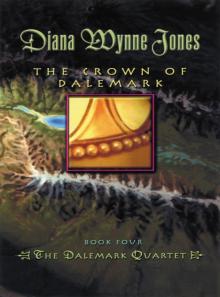 The Crown of Dalemark
The Crown of Dalemark Deep Secret
Deep Secret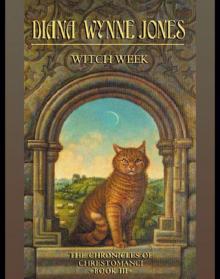 Witch Week
Witch Week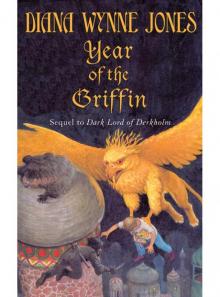 Year of the Griffin
Year of the Griffin Wild Robert
Wild Robert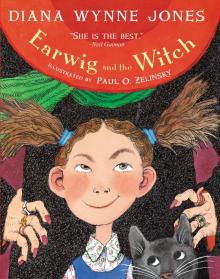 Earwig and the Witch
Earwig and the Witch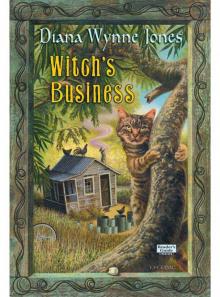 Witch's Business
Witch's Business Dogsbody
Dogsbody Caribbean Cruising
Caribbean Cruising Cart and Cwidder
Cart and Cwidder Conrad's Fate
Conrad's Fate Howl's Moving Castle
Howl's Moving Castle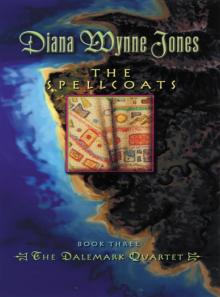 The Spellcoats
The Spellcoats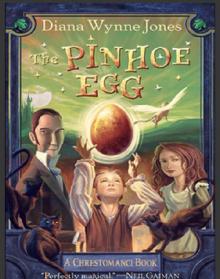 The Pinhoe Egg
The Pinhoe Egg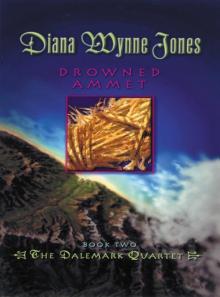 Drowned Ammet
Drowned Ammet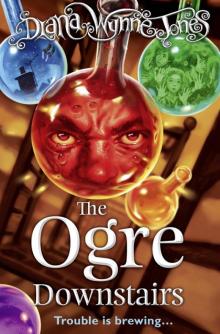 The Ogre Downstairs
The Ogre Downstairs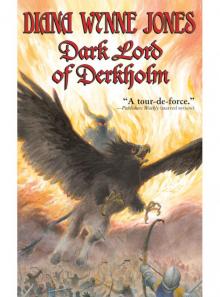 Dark Lord of Derkholm
Dark Lord of Derkholm Castle in the Air
Castle in the Air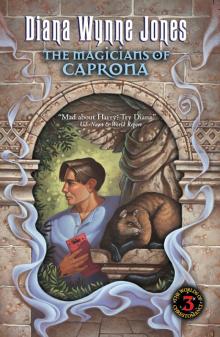 The Magicians of Caprona
The Magicians of Caprona A Tale of Time City
A Tale of Time City The Lives of Christopher Chant
The Lives of Christopher Chant The Magicians of Caprona (UK)
The Magicians of Caprona (UK)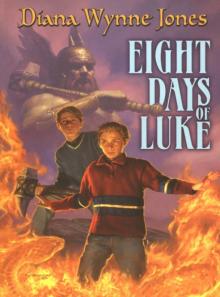 Eight Days of Luke
Eight Days of Luke Conrad's Fate (UK)
Conrad's Fate (UK) A Sudden Wild Magic
A Sudden Wild Magic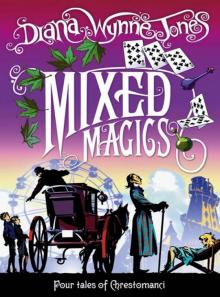 Mixed Magics (UK)
Mixed Magics (UK)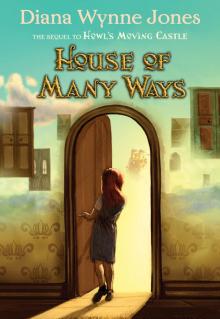 House of Many Ways
House of Many Ways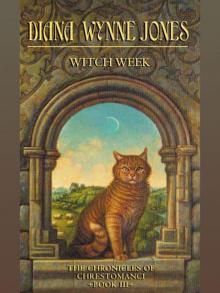 Witch Week (UK)
Witch Week (UK) The Homeward Bounders
The Homeward Bounders The Merlin Conspiracy
The Merlin Conspiracy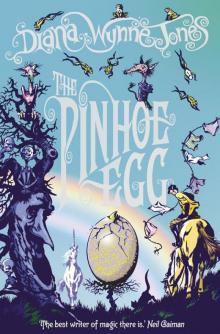 The Pinhoe Egg (UK)
The Pinhoe Egg (UK)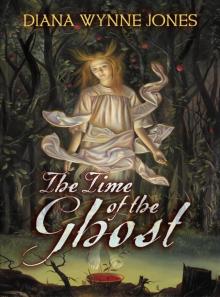 The Time of the Ghost
The Time of the Ghost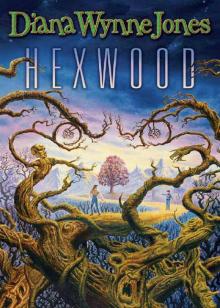 Hexwood
Hexwood Enchanted Glass
Enchanted Glass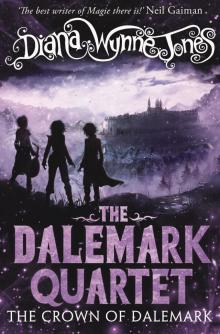 The Crown of Dalemark (UK)
The Crown of Dalemark (UK)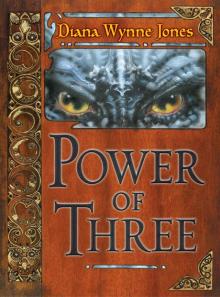 Power of Three
Power of Three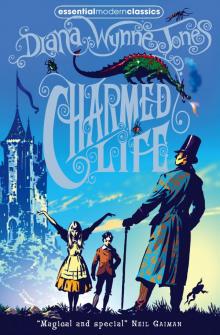 Charmed Life (UK)
Charmed Life (UK)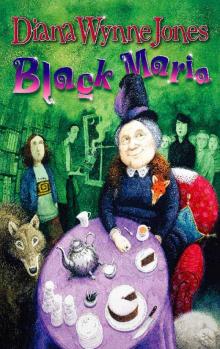 Black Maria
Black Maria The Islands of Chaldea
The Islands of Chaldea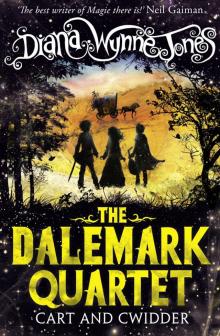 Cart and Cwidder (UK)
Cart and Cwidder (UK) Drowned Ammet (UK)
Drowned Ammet (UK) Charmed Life
Charmed Life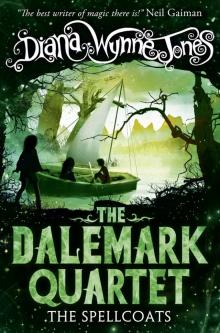 The Spellcoats (UK)
The Spellcoats (UK)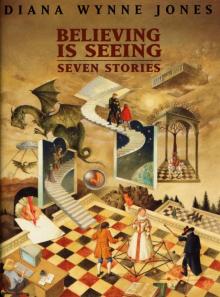 Believing Is Seeing
Believing Is Seeing Samantha's Diary
Samantha's Diary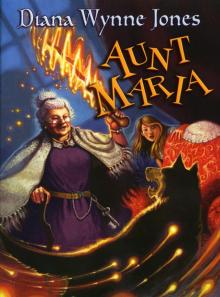 Aunt Maria
Aunt Maria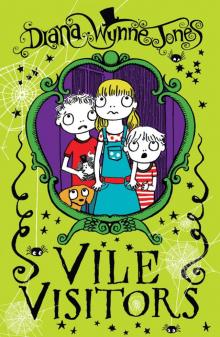 Vile Visitors
Vile Visitors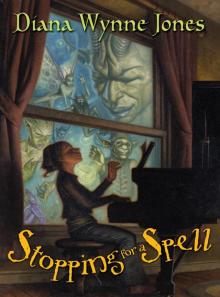 Stopping for a Spell
Stopping for a Spell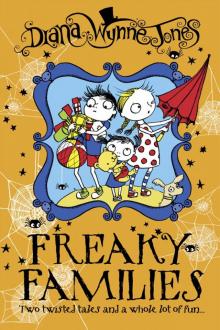 Freaky Families
Freaky Families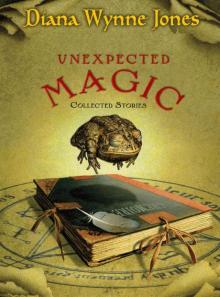 Unexpected Magic
Unexpected Magic Reflections
Reflections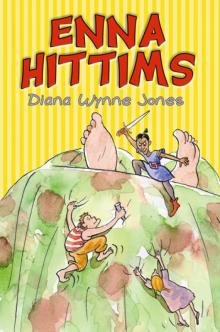 Enna Hittms
Enna Hittms Mixed Magics: Four Tales of Chrestomanci
Mixed Magics: Four Tales of Chrestomanci